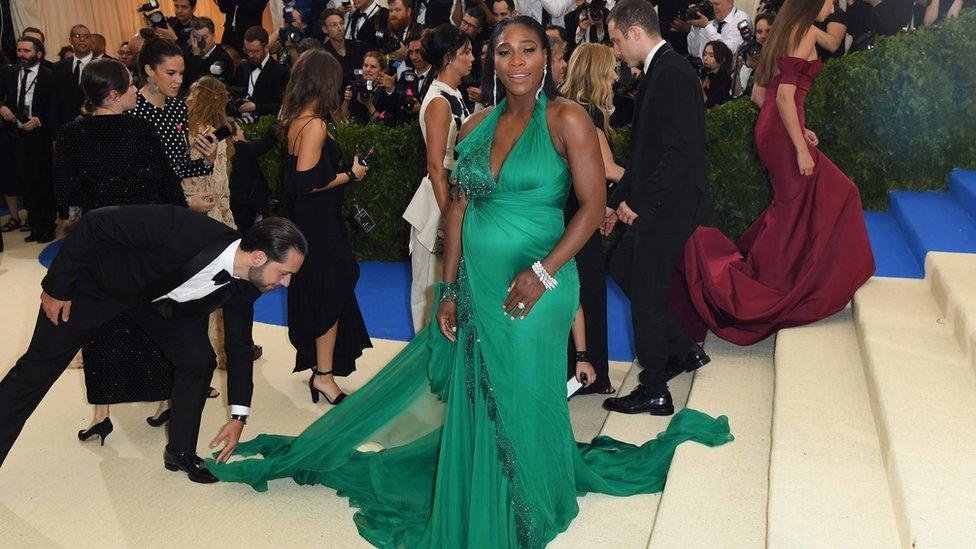Serena Williams rallies black women for equal pay
- Published

Serena Williams on 1 May 2017 at the Costume Institute Benefit at the Metropolitan Museum of Art in New York
Top tennis star Serena Williams has called on black women to step up their demands for equal pay.
Writing in , the world's highest-earning female athlete urges black women to be "fearless" and to "fight for every penny".
She wrote: "Speak out for equal pay. Every time you do, you're making it a little easier for a woman behind you."
Campaigners in the UK have hailed her initiative, saying that there should be action on the pay gap.
Her comments were published to highlight black women's equal pay day.
Williams, who has won 23 Grand Slam singles titles, has previously complained about racism and sexism, both inside and outside tennis.
In her article, she said that black women in the US were affected much more by gender discrimination than white women.
Black women earn only 63 cents for every dollar a man earns and black women earn 17% less than white female counterparts, she wrote.
She also argued that black female university graduates were paid less, and that this discrimination was as strong in the high-paying high-tech industries of Silicon Valley as among workers in inner cities.
That, she said, meant that black women would need to work on average eight months longer every year than their male counterparts just to earn the same amount of money.
"Unfair pay has prevailed for far too long with no consequence," Williams said.
"The issue isn't just that black women hold lower-paying jobs. They earn less even in fields of technology, finance, entertainment, law, and medicine," added the tennis star.
Her article argued that the injustice of lower pay can be tackled by legal changes, "employer recognition", and courageous workers demanding more.
But a vital step, she said, was for the problem to be put in the spotlight.
"We need to push this issue to the front of conversations, so that employers across the US can truly understand that all male and female employees must be compensated equally," she argued.
"Not close. Not almost the same. Equally," she emphasised.
To some eyes, it might appear incongruous that one of the world's richest women - she reportedly earned $27m last year - should be raising a standard for equal pay for poorer black women.
But in her article, Williams addressed that head-on.
"I am in the rare position to be financially successful beyond my imagination," she acknowledged.
"I had talent, I worked like crazy and I was lucky enough to break through.
"But today isn't about me. It's about the other 24 million black women in America.
"If I never picked up a tennis racket, I would be one of them; that is never lost on me," she added.
'Time for action'
The Fawcett Society, a long-established charity that campaigns for women's rights, welcomed the tennis star's stance.
"It's great that Serena Williams has used her position as the best tennis player of her generation to call for action on the pay gap for black women in the US," said Andrew Bazeley of the society.
"Fawcett research with the University of Manchester has found that in the UK women from almost all ethnic groups are paid less than white British men.
"Black African women have a gap of 20% for full-time work and progress has stagnated for them since the 1990s.
"Pakistani and Bangladeshi women see a 26% gap overall, putting them where white British women were in the 1990s," he added.
Frances O'Grady, head of the TUC trade union organisation in the UK, echoed those comments.
"It's time for government to require employers to publish pay data broken down by ethnicity," she said.
"Then we can see where the problems are and put pressure on bosses to close the pay gap."